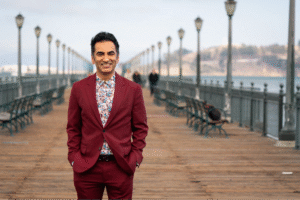Entrepreneurship is often about identifying gaps and finding ways to fill them. For Shay Safarzadeh and Shab Safarzadeh, it’s about more than just solving problems, it’s about creating lasting impact. The twin sisters, co-founders and multi-industry entrepreneurs, have built businesses spanning healthcare, education, technology, and fashion, all with a common goal: accessibility and social impact.
At The Lively Grit Daily House at SXSW 2025, they shared their journey — how they’ve scaled businesses, navigated industries, and embedded philanthropy into every venture. Their conversation made it clear that their success is as much about purpose-driven leadership as it is about business.
Entrepreneurship Rooted in Accessibility and Impact
The Safarzadeh sisters didn’t enter the entrepreneurial world looking for traditional success. Their ventures were all born from a desire to make essential services more accessible. Shay emphasized that across every industry they’ve entered, the biggest commonality they’ve found is a lack of access — whether it’s in education, professional opportunities, or even ethical fashion. That realization shaped their businesses, driving them to create solutions that bridge those gaps.
For Shab, social impact is the guiding principle. Whether it’s offering scholarships through their foundation or ensuring their fashion line operates with ethical and sustainable practices, every decision they make is tied to a larger mission. They see entrepreneurship as a vehicle for change, not just for profit.
Confidence, Passion, and Fearlessness
One of the biggest hurdles for aspiring entrepreneurs is the fear of taking the first step. For the Safarzadeh twins, that step was fueled by passion and an unshakable belief in their mission. Shay recalled struggling to find her strength early on, growing up in a Persian household with a rigid definition of success. But she soon realized that her ability to problem-solve and take risks was her greatest asset.
Both sisters emphasized that fearlessness is contagious. If a founder exudes confidence, that energy attracts investors, partners, and a strong team. They don’t just launch businesses, they lead them with conviction, which in turn, inspires others to believe in their vision.
Learning from the Right People
While belief in oneself is critical, mentorship is what turns ambition into action. The Safarzadeh twins credit strong mentorship as a major factor in their success. From the early days of launching their first business — without even knowing how to properly register a company — they leaned on legal expert and entrepreneur Sankeetha Selvarajah, who guided them through business structuring and intellectual property protection.
Their key advice? Don’t be afraid to seek mentorship. The biggest mistake many aspiring entrepreneurs make is assuming successful people don’t have the time to help. The reality? Most great leaders enjoy giving back. But mentorship only works when you actively listen and apply what you learn, something the twins mastered early on.
Risk-Taking and the Art of Staying Resilient
Every entrepreneur faces risk, but calculated risks backed by conviction create opportunity. Shay and Shab are currently launching their second tech company — fully self-funded. It’s a massive risk, but because they believe in the product and its potential, they’re attracting investors who share that belief.
They also understand that failure isn’t the end, it’s part of the process. As Shay put it, “The only way you can fail is if you just stop.” Instead of fearing setbacks, they embrace them, pivoting when needed while staying committed to their long-term goals.
Building Teams That Challenge, Not Just Follow
One of the strongest takeaways from the discussion was their approach to leadership. The best teams aren’t built with yes-men, they’re built with challengers. The twins actively seek out team members who push back, question decisions, and help refine ideas. They don’t see leadership as being the loudest voice in the room but rather as knowing when to listen.
For Shay, a key leadership lesson was learning when to speak last. By allowing her team to contribute first, she creates a space for innovation and collaboration rather than just directing orders. Shab echoed this, saying that the best teams feel like co-leaders, not subordinates. It’s an approach that fosters loyalty, creativity, and high performance.
The Safar Foundation
For Shay and Shab, entrepreneurship and philanthropy go hand in hand. Their Safar Global Foundation was born from their healthcare education company, where they witnessed firsthand how many young women lacked access to basic education. Their foundation now funds schools and training programs for girls in underserved regions worldwide.
Just one year into its launch, the foundation is already making an impact:
- Opening a school in Tanzania in October 2025.
- Partnerships with global figures, funding programs in Nigeria and beyond.
- Plans to expand into Middle Eastern regions affected by war and displacement.
Their ability to scale both their businesses and their philanthropic work proves one of their core beliefs: business should be a force for good.
Own Your Seat at the Table
As the panel wrapped up, the Safarzadeh twins left the audience with a clear message:
- Know your industry inside and out before trying to disrupt it.
- Never doubt your place at the table.
- Embrace failure and keep moving forward.
- Surround yourself with people who challenge you.
Their journey proves that success isn’t just about business acumen, it’s about passion, resilience, and the willingness to create meaningful change. The future of entrepreneurship is in purpose-driven innovation, and the Safarzadeh twins are leading the charge.








